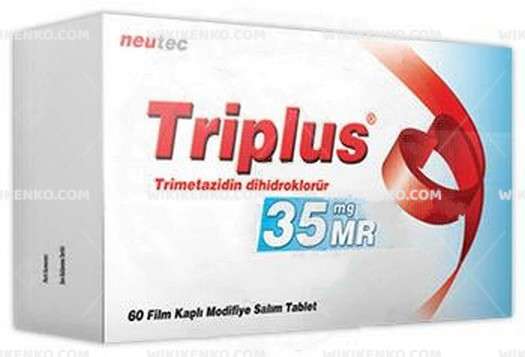Triplus Mr Film Coated Modifiye Salim Tablet
Discover the intricacies of Triplus MR, a film-coated modified-release tablet designed to tackle angina pectoris. In this comprehensive guide, we delve into its composition, indications, contraindications, precautions, administration guidelines, potential side effects, and more.
| Dosage form | |
|---|---|
| Pack size | |
| Potency | 35 Mg |
| Manufacturer | |
| Origin | |
| Generic Name (Ingredient) | Trimetazidine Dihydrochloride 35 Mg |
Assuming your emergency circumstances for this product, visit Urgent Quotation page. Besides, for any pharmaceutical questions, please ask us in the comments section.
Description
Ingredients
The Active Ingredient: Triplus MR revolves around the active ingredient, Trimetazidine dihydrochloride, present in a 35 mg dosage. This compound forms the core of the tablet’s therapeutic potential.
Excipients in Harmony: Supporting the active ingredient are excipients such as dibasic calcium phosphate dihydrate, polyethylene oxide, crospovidone, colloidal silica, povidone, magnesium stearate, and aquarius prime BAP310124 pink.
Indications and Mechanism of Action
A Solution for Angina Pectoris: Triplus MR steps in as a key player in the management of angina pectoris, specifically targeting chest pain caused by coronary disease. It operates effectively when used in conjunction with other medications.
Contraindications
Allergic Alertness: Triplus MR should be avoided by individuals allergic to trimetazidine or any of its tablet components. Furthermore, it is contraindicated for those with Parkinson’s disease or severe kidney problems.
Precautions
Efficacy and Limitations: Triplus MR is adept at preventing angina attacks but is not a curative measure for ongoing episodes. It is not the primary choice for unstable angina pectoris or the treatment of a heart attack (myocardial infarction). If an angina attack occurs during treatment, consulting a healthcare provider is imperative.
Elderly Consideration: Elderly patients may experience symptoms like tremors, slow movements, or unsteady gait. Reporting these symptoms to a healthcare provider is essential for potential treatment adjustments.
Breastfeeding Awareness: it is generally not recommended during breastfeeding.
Administering
Time and Method: Triplus MR is administered orally with meals. The daily regimen consists of one tablet in the morning and one in the evening. These tablets should be swallowed whole with an ample amount of water, avoiding any attempt at crushing or chewing.
Individual Adjustments: Patients with kidney problems or those aged over 75 may require dosage adjustments. Adhering to the prescribed regimen is crucial. After three months of use, the treatment’s benefits should be assessed. If no response is observed, discontinuation may be considered.
Triplus MR Side Effects
Variety of Effects: Triplus MR may induce side effects, which can include headache, dizziness, sleepiness, vomiting, nausea, constipation, sweating, dry mouth, agitation, anxiety, itching, diarrhea, and dyspepsia. While this is not an exhaustive list, it represents common side effects. It is crucial to remember that not everyone experiences these effects.
Onset of Action
Timely Relief: The onset of action for Triplus MR may vary among individuals. Some may experience relief shortly after commencing treatment, while others might require several weeks. Consistent adherence to the prescribed regimen is essential for optimal results.
Alcohol
Inadvisable Combination: Combining Triplus MR with alcohol is not recommended. This combination can lead to the mutual reinforcement of inhibitory effects on the central nervous system. It is prudent to seek guidance from a healthcare provider before consuming alcohol while on any medication.
Weight and Triplus MR
Steadfast Effect: Triplus MR is not associated with significant weight gain or loss as a side effect. Any concerns about potential side effects should be addressed with a healthcare provider for personalized guidance.
Conclusion
In conclusion, Triplus MR stands as a dedicated ally in the management of angina pectoris. Rooted in precision and efficacy, it offers a solution for those dealing with the burden of chest pain caused by coronary disease. However, it is crucial to exercise vigilance regarding contraindications, dosage, and potential side effects. As patients embark on their journey, they gain access to a therapy designed to provide relief and enhance their quality of life.
Use the form below to report an error
Please answer the questions as thoroughly and accurately as possible. Your answers will help us better understand what kind of mistakes happen, why and where they happen, and in the end the purpose is to build a better archive to guide researchers and professionals around the world.
The information on this page is not intended to be a substitute for professional medical advice, diagnosis, or treatment. always seek the advice for your physician or another qualified health provider with any questions you may have regarding a medical condition. Always remember to
- Ask your own doctor for medical advice.
- Names, brands, and dosage may differ between countries.
- When not feeling well, or experiencing side effects always contact your own doctor.
Cyberchondria
The truth is that when we’re sick, or worried about getting sick, the internet won’t help.
According to Wikipedia, cyberchondria is a mental disorder consisting in the desire to independently make a diagnosis based on the symptoms of diseases described on Internet sites.
Why you can't look for symptoms on the Internet
If diagnoses could be made simply from a textbook or an article on a website, we would all be doctors and treat ourselves. Nothing can replace the experience and knowledge of specially trained people. As in any field, in medicine there are unscrupulous specialists, differences of opinion, inaccurate diagnoses and incorrect test results.



Reviews
There are no reviews yet.